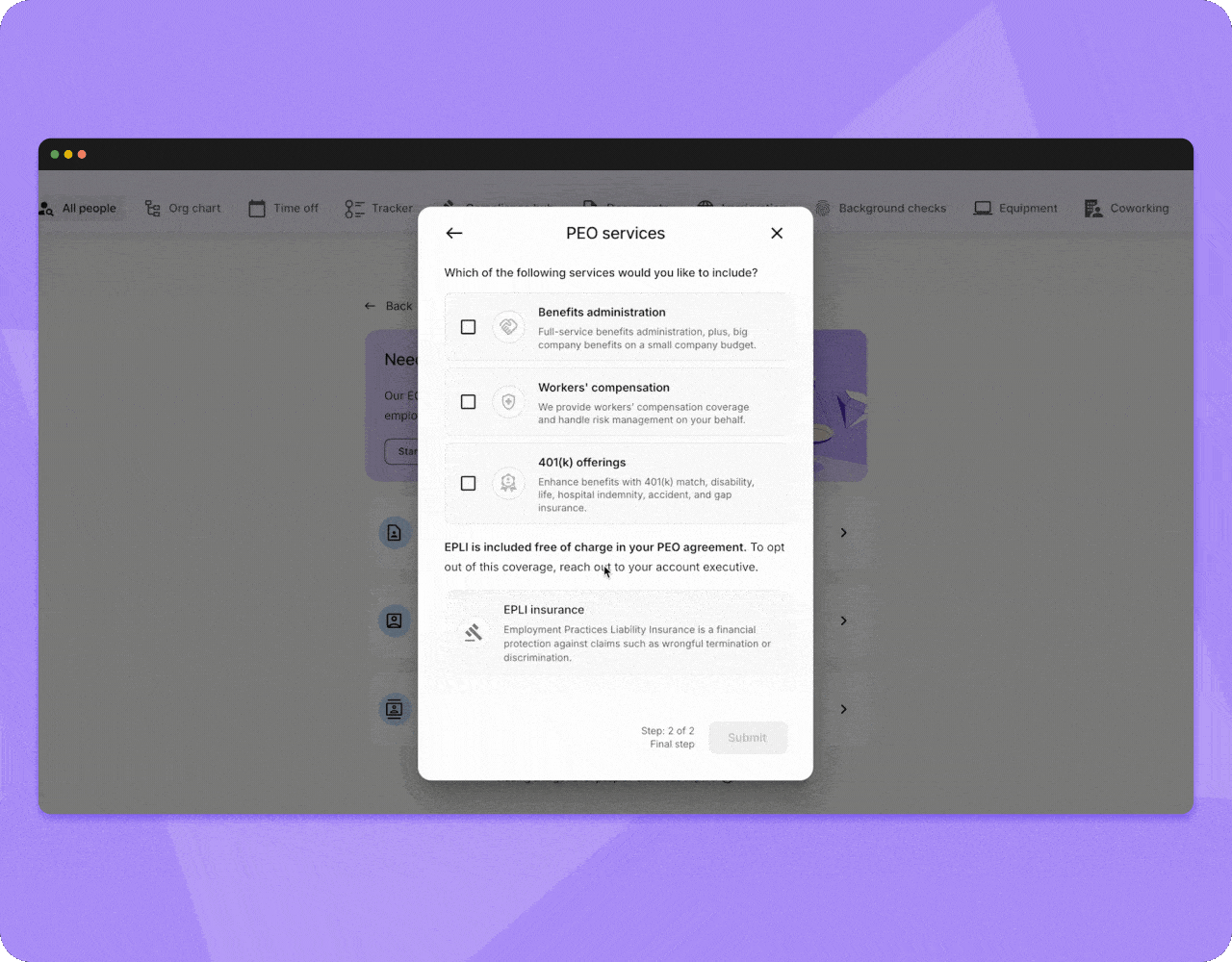Article
12 min read
A Guide to PEO in Washington
PEO

Author
Shannon Ongaro
Last Update
July 30, 2025

Table of Contents
How a PEO works in Washington State
What are the registration requirements for PEOs in Washington?
What are the benefits of partnering with a Washington PEO?
Payroll and employment laws in Washington
Additional requirements and enforcement
How to Choose the Right PEO in Washington
Manage your Washington, US, and global workers with Deel PEO
Key takeaways
- Washington’s labor and employment laws often set standards beyond federal requirements, especially for minimum wage, taxes, and discrimination.
- Washington's labor and employment laws are enforced by the Washington State Department of Labor and Industries (L&I).
- By partnering with Deel PEO, employers can ensure they’re fully compliant with local, state, and federal requirements in Washington, and offer high-value benefits plans at affordable prices.
A professional employer organization (PEO) in Washington is a licensed HR partner that helps businesses manage payroll, benefits, and compliance with state-specific labor laws. It operates under a co-employment model, taking on key administrative responsibilities while the employer maintains day-to-day operational control.
Read on to learn more about the process and benefits of using a PEO in Washington.
How a PEO works in Washington State
Washington’s labor laws differ significantly from other states, especially in minimum wage, taxation, and employment protections. A PEO helps companies stay compliant with these local regulations while providing cost-effective access to benefits and HR services.
By forming a co-employment relationship, the PEO becomes the employer of record for tax and compliance purposes while the client company directs day-to-day work. This dual structure gives businesses more flexibility and protection.
Learn more: PEO Services: A State-by-State Guide for US Employers

What are the registration requirements for PEOs in Washington?
Washington requires all PEOs to register each client company, regardless of the PEO’s location or whether the client has employees in Washington. This applies even if the business only operates in the state without physical staff.
Mandatory documentation includes:
- Form W-4
- Form I-9
- PEO Arbitration Agreement
- Employee Communications Consent
- WSE Notice of PEO Relationship
- Washington Paid Sick Leave notice
- Sexual Harassment Policy acknowledgment
- Washington State Tax Form
These ensure full compliance with state and federal laws.
What are the benefits of partnering with a Washington PEO?
1. HR efficiency
Washington-based companies can outsource time-consuming HR tasks—like payroll, benefits admin, and reporting—to a PEO. This reduces administrative overhead and helps finance leaders focus on growth.
2. Expert compliance support
With Washington’s evolving labor landscape, a PEO provides up-to-date legal expertise, minimizing the risk of penalties and violations.
How does a PEO help with Washington labor laws?
A PEO ensures your business meets requirements for paid sick leave, minimum wage, pay transparency, and more. It monitors changes in legislation and helps you adjust policies accordingly.
3. Affordable employee benefits
PEOs pool employees from multiple companies to negotiate better rates on insurance and retirement plans. Washington employers can offer competitive benefits without incurring high individual costs.
4. Stronger risk management
From wage violations to labor disputes, PEOs proactively manage legal exposure. For example, in 2023, Allied Universal was fined $1.1M after a federal probe found overtime violations in Seattle. A PEO would help prevent such issues through proactive compliance.
Deel PEO
Payroll and employment laws in Washington
Washington frequently exceeds federal labor standards. Here are key regulations to understand:
Payroll laws
Minimum wage
Washington’s statewide minimum wage is $16.66 per hour. However, some jurisdictions have higher rates:
- Seattle: $20.76
- SeaTac: $20.17 (transportation and hospitality sectors)
- Tukwila: $21.10 (500+ employees) / $20.10 (fewer than 500 employees)
See all US minimum wage requirements
Income tax
Washington does not impose personal or corporate income tax. Instead, businesses may be subject to a Business and Occupation (B&O) tax and/or public utility tax.
Learn more about income tax rates across the US
Overtime
Employees must receive overtime pay of at least 1.5× their standard hourly rate for work beyond 40 hours in a 7-day week. Washington does not mandate double-time, except in specific public works cases.
Explore overtime laws by state
Paydays and pay periods
Employers must pay employees at least monthly, on a fixed payday. Employers can require direct deposit, but they may also offer debit or prepaid cards.
Final paychecks
Final wages must be paid on the next scheduled payday, regardless of whether an employee quits or is terminated.
Pay transparency
Employers with 15+ employees must include wage scales or salary ranges in all job postings. Employees offered promotions or transfers may also request pay range details.
See national pay transparency laws
Paid sick leave
Washington employers must provide paid sick leave at a minimum rate of 1 hour for every 40 hours worked. Employers can offer more generous policies.
Review sick leave laws by state
Workers' compensation
Workers' compensation insurance is mandatory and administered through the Washington Department of Labor & Industries (L&I). Most employers must deduct premiums via payroll.
Paid Family and Medical Leave (PFML) program
Washington State's Paid Family and Medical Leave (PFML) program provides eligible employees with paid leave for certain family and medical reasons. The program is administered by the Employment Security Department (ESD) of Washington State.
Labor laws
WISHA (Washington Industrial Safety and Health Act)
WISHA expands upon federal OSHA protections and applies to nearly all employers and industries in Washington.
Right to Work
Washington is not a right-to-work state. Employers may negotiate contracts that require union membership or dues as a condition of employment.
Meal and rest breaks
Employees are entitled to a 10-minute paid break for every 4 hours worked. Shifts over 5 hours require a 30-minute meal break between the second and fifth hour.
Employment laws
At-will employment
Washington is an at-will employment state, allowing termination without cause, provided it does not violate anti-discrimination laws.
Worker classification
Washington uses separate classification tests for construction/electrical and other industries to determine independent contractor status.
Fair Chance Act
The Fair Chance Act prohibits asking about criminal history until after determining the applicant is otherwise qualified.
Equal Pay and Opportunities Act
Washington enforces strict equal pay laws and allows employees to discuss wages freely.
See more on pay transparency laws
Non-compete agreements
Washington limits enforceability of non-compete clauses, particularly for employees earning below a specific threshold.
Additional requirements and enforcement
The information above only covers some of the payroll, labor, and employment laws in Washington. Washington’s labor and employment laws are enforced by the Washington State Department of Labor and Industries (L&I). L&I oversees various aspects of employment within the state, including workers’ compensation, workplace safety, minimum wage, and overtime requirements, among others.
Where there is overlap between federal, state and/or local law, companies will generally be required to comply with the law that offers the greatest rights or benefits to the employee.
Deel Payroll - US
How to Choose the Right PEO in Washington
Step 1: Define business goals
Audit current HR processes. What are your compliance gaps, hiring plans, and employee needs?
Step 2: Research local experience
Choose a PEO with proven expertise in Washington labor law. Ask for case studies and industry recognition.
Step 3: Evaluate services and tools
Ensure the PEO offers robust HR software, benefits access, and scalable solutions.
Step 4: Assess compliance strategy
Ask how they monitor law changes, communicate updates, and document compliance efforts.
What questions should I ask a Washington PEO?
- How do you adapt to new state labor laws?
- Can I review your client audit process?
- Do you support unionized employees?
- How fast can you onboard a new hire in Washington?
Step 5: Review the support model
Check if you'll have a dedicated HRBP or account manager. Understand the PEO's service hours and communication methods.
Step 6: Finalize the contract
Negotiate clear terms, fees, exit clauses, and expectations. Consider legal review.
Step 7: Plan the implementation and transition
Coordinate closely with your PEO to integrate systems, align timelines, and test key workflows. Communicate clearly with your team about what to expect and schedule regular check-ins for a smooth rollout.
Manage your Washington, US, and global workers with Deel PEO
Deel PEO makes payroll and HR management easy, whether you’re hiring in one state, across the country, or around the world.
Fully in-house support
Deel PEO is run entirely by internal specialists, including certified professionals, licensed advisors, and dedicated HRBPs. Clients get direct access to expert guidance across payroll, benefits, and compliance, with no third-party handoffs or delays.
Benefits admin made easy
Admins can choose, enroll, and manage health benefits for US employees directly in the Deel platform. They can view costs, track coverage, and handle renewals—all in one place, without chasing brokers or juggling paperwork.

Exclusive access to Aetna International plans
For teams with globally mobile employees, Deel is the only PEO to offer Aetna International health plans, ensuring continuous coverage across borders without needing to manage separate providers.
All-in-one platform
Admins can manage hiring, onboarding, payroll, and benefits in one place. Deel simplifies every step, from enrollment to renewals, reducing HR admin time.
Compliance coverage at every level
Deel helps businesses meet federal, state, and local employment laws, taking the guesswork out of US HR compliance.
Book a demo to learn more about using Deel PEO in Washington.
Disclaimer: This article is intended for informational purposes and should not be considered legal advice. Consult a qualified licensed attorney for help on legal issues. Content is accurate at the time of publishing.

Shannon Ongaro is a content marketing manager and trained journalist with over a decade of experience producing content that supports franchisees, small businesses, and global enterprises. Over the years, she’s covered topics such as payroll, HR tech, workplace culture, and more. At Deel, Shannon specializes in thought leadership and global payroll content.
















